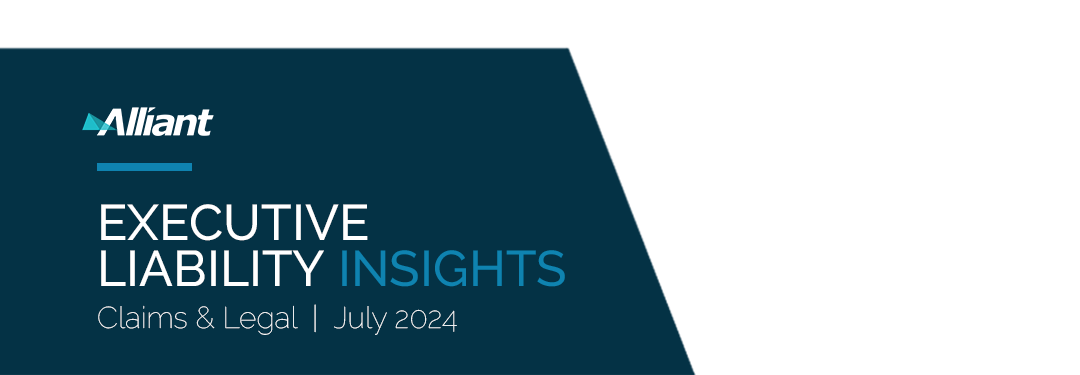
Navigating today’s complex risk environment can be a monumental task. Steve Shappell, Alliant Claims & Legal, spearheads Executive Liability Insights, a monthly review of news, legal developments and information on executive liability, cyber risk, employment practices liability, class action trends and more.


FEATURED ARTICLE
SUPREME COURT ENDS CHEVRON DEFERENCE
Loper Bright Enterprises, et al. v. Gina Raimondo, Secretary of Commerce, et al., 2024 U.S. LEXIS 2882 (June 28, 2024).
The Supreme Court recently held that Chevron deference, the doctrine that instructs judges to defer to federal agencies' interpretations of law in rulemaking, improperly prioritized the executive branch's legal interpretations over the judicial branches’ guidance.
In This Issue:
COVERAGE NEUTRALITY – DISTRICT COURT RULES THAT INSURER CANNOT IMPROPERLY INTERVENE IN INSUREDS’ INTERNAL BOARD DISPUTES
Free Speech Found., Inc. v. Phila. Indem. Ins. Co., 2024 U.S. Dist. LEXIS 112382 (D. Nev.; July 1, 2024).
In a recent coverage dispute alleging breach of contract and fiduciary duties, a Federal Court ruled in favor of the Executive Director (the “Director”) of a political organization (the “Organization”).
Read More >>
D&O PROFESSIONAL SERVICES EXCLUSION BARS COVERAGE FOR SOFTWARE DESIGN
Practice Fusion v. Freedom Specialty Ins. Co., 2024 Cal. App. Unpub. LEXIS 3822 (Cal. Ct. App. June 21, 2024).
A California court held that a professional services coverage exclusion in a directors and officers liability insurance policy barred coverage for an alleged kickback scheme stemming from a software design. A company that developed and licensed electronic health record software for use by healthcare providers (the “Company”) entered a civil settlement following an investigation by the US Department of Justice (the “DOJ”) to resolve an alleged violation of the federal Anti-Kickback Statute.
Read More >>
INSURERS COULD NOT WITHOLD CONSENT TO A SETTLEMENT UNREASONABLY, BUT WHAT DOES THIS MEAN?
Mist Pharms., LLC v. Berkley Ins. Co., 2024 N.J. Super. LEXIS 57 (July 9, 2024).
An appellate New Jersey court held that the insurer’s refusal to consent to settle did not require them to provide defense to the Insured. An investment company sued a pharmaceutical company (the “Company”), its director (the “Director”), and other entities on which the Director served (the “Middlemen entities”), alleging that the Director engaged in a self-dealing scheme that defrauded the investment company.
Read More >>
SECOND CIRCUIT REINFORCED SHAREHOLDER STANDING TO ASSERT SHORT-SWING PROFIT CLAIMS UNDER SECTION 16(B)
Packer v. Raging Capital Management, LLC, 105 F.4th 46 (2d Cir.; May 6, 2024).
In its recent decision, the Second Circuit Court of Appeals held that shareholders have standing to sue “beneficial owners” who engage in short-swing trading under Section 16(b) of the Securities and Exchange Act of 1934 (“Section 16(b)”). This derivative suit was filed by a shareholder of a major floral retailer against a hedge fund that bought and sold stock while it was a ten-percent beneficial owner of the retailer in violated of Section 16(b).
Read More >>
A FEDERAL CIRCUIT COURT BROADLY APPLIED THE BREACH OF CONTRACT EXCLUSION
Paraco Gas Corp. v. Ironshore Indem., Inc., 2024 U.S. App. LEXIS 14628 (2d Cir., June 17, 2024).
A breach of contract exclusion under a directors and officers liability (the “D&O”) policy would exclude a count that could not exist but-for the violation of an agreement that was alleged in all other counts, says a high positioned federal court.
Read More >>
SECOND CIRCUIT RULES AGAINST THE ENFORCEABILITY OF ARBITRATION CLAUSES IN ERISA PLANS
Cedeno v. Sasson, 100 F.4th 386 (2d Cir. 2024).
Recently, a federal circuit court solidified an ongoing conflict between the courts regarding the enforcement of individual action arbitration clauses (“arbitration clauses”) in employees’ ERISA plans. The divide among these courts was whether these arbitration clauses deprived ERISA claimants of their statutory rights. Here, the court held that mandatory arbitration provisions in employees’ plans were not enforceable.
Read More >>
OTHER INSURANCE CLAUSE RELIEVES INSURER OF ITS DUTY TO DEFEND OBLIGATIONS
Great Am. Ins. Co. v. State Farm Fire & Cas. Co., 1:22-cv-03765 (7th Cir.; June 24, 2024).
The Seventh Circuit held that a personal liability umbrella insurer (the “Umbrella Insurer”) with clear “Other Insurance” clause had no duty to defend the underlying matter because the insurance company that inherited the claim at issue (the “Assignee Insurer”) had a policy that provided primary coverage.
Read More >>
CYBER CORNER
Click to read the following cases:
- RANSOMWARE ATTACK ON SOFTWARE PROVIDER HOBBLES CAR DEALERSHIPS NATIONWIDE
Read More >>
EMPLOYMENT CORNER
Click to read the following cases:
- REFORMS TO PAGA, LIKELY TO RESULT IN MORE STRATEGIC FILINGS
Read More >>
SECURITIES CORNER
Click to read the following cases:
- SUPREME COURT RULES SEC CIVIL FRAUD CASES CAN ONLY BE ADJUDICATED IN FEDERAL COURT
- JUNE 2024 NOTEWORTHY ENFORCEMENT ACTIONS FILED
- JUNE 2024 NOTEWORTHY SETTLEMENTS AND JUDGEMENTS
Read More >>
SHAREHOLDER CORNER
Click to read the following cases:
- JUNE 2024 SECURITIES CLASS ACTION FILINGS
Read More >>
SUPREME COURT ENDS CHEVRON DEFERENCE
Loper Bright Enterprises, et al. v. Gina Raimondo, Secretary of Commerce, et al., 2024 U.S. LEXIS 2882 (June 28, 2024).


The Supreme Court recently held that Chevron deference, the doctrine that instructs judges to defer to federal agencies' interpretations of law in rulemaking, improperly prioritized the executive branch's legal interpretations over the judicial branches’ guidance. The dispute at issue concerned regulation of fisheries and the ability of the National Marine Fisheries Service, a federal agency, to mandate that fishing vessels pay for observers aboard their vessels required by a fishery management plan. The lower court found there may have been ambiguity in the regulation, however, deference to the agency’s interpretation would be warranted under Chevron.
The Supreme Court reversed the lower court and the longstanding Chevron doctrine and found that the final interpretation of laws was solely a judicial power. Although, consideration of the executive branch’s views may help inform judges, the judicial branch must exercise its independent judgment in deciding whether an agency has acted within its statutory authority. This decision could drastically impact the ability to challenge regulators across all industries.
COVERAGE NEUTRALITY – DISTRICT COURT RULES THAT INSURER CANNOT IMPROPERLY INTERVENE IN INSUREDS’ INTERNAL BOARD DISPUTES
Free Speech Found., Inc. v. Phila. Indem. Ins. Co., 2024 U.S. Dist. LEXIS 112382 (D. Nev.; July 1, 2024).


In a recent coverage dispute alleging breach of contract and fiduciary duties, a Federal Court ruled in favor of the Executive Director (the “Director”) of a political organization (the “Organization”). According to the allegations, the Insurer improperly intervened in a tumultuous leadership dispute and failed to investigate fraud when it supported the usurping board while disregarding the facts pointing to the illegitimacy of that board.
The background of this case involved an attempt to take over the board of the Organization while the Director received a brief prison sentence. The Director argued that they never resigned from the board or lost their director status at the company and filed a lawsuit against the usurping board members who have tendered the matter to their Insurer. The few of the usurping board members switched sides and ended up returning to support the Director upon learning of financial malfeasance of the usurping board. The returned support helped the Director to reclaim their status; however, the Insurer continued to support the usurping temporary board and refused coverage for the Director. The Director, on behalf of the Organization, filed a claim against the Insurer for not providing coverage to them and their allies against the “fake board.”
Among many allegations, the court allowed the theory that the Insurer breached the contract to survive the motion to dismiss; however, the court held that contrary to the allegations the Insurer was not guilty of aiding and abetting tort. The court also noted that the Insurer did not breach the covenant of good faith and fair dealing.
Given that the composition of the Board was still in flux, the court indicated at the motion to dismiss stage that the Insurer should not have made its own determinations as to the proper makeup of the Board. In the court’s view, the Insurer appeared critical of the Insured’s political standing and may have been swayed by its own personal preferences in its denial of coverage for the Director, who has been an increasingly controversial figure in the “medical freedom” movement. According to the court, the Insured failed to take a neutral position with respect to ascertaining which individuals were entitled to coverage.
Interestingly, the court did not mention any potential insured vs. insured policy exclusion that would potentially have barred coverage.
D&O PROFESSIONAL SERVICES EXCLUSION BARS COVERAGE FOR SOFTWARE DESIGN
Practice Fusion v. Freedom Specialty Ins. Co., 2024 Cal. App. Unpub. LEXIS 3822 (Cal. Ct. App. June 21, 2024).


A California court held that a professional services coverage exclusion in a directors and officers liability insurance policy barred coverage for an alleged kickback scheme stemming from a software design. A company that developed and licensed electronic health record software for use by healthcare providers (the “Company”) entered a civil settlement following investigation by US Department of Justice (the “DOJ”) to resolve an alleged violation of the federal Anti-Kickback Statute. The DOJ alleged that the Company solicited and received remuneration from pharmaceutical companies in exchange for agreeing to "deploy within its . . . software" alerts intended to promote the companies' products, and for "arranging for or recommending purchasing or ordering" the companies' products.
The Company sought coverage for the settlement under its D&O program, which was denied. The insurer argued the claim arose from the Company providing professional services by designing and implementing software and was thus barred by the professional services exclusion. The court agreed and the Company appealed.
The Company argued it was providing a product, in the form of advertising space, rather than professional services. The appellate court disagreed. Ultimately, the contracts that gave rise to the DOJ's allegations against the company were not contracts in which the Company agreed to provide end products; they were contracts in which a major objective was for the Company to provide its clients with services by deploying alerts in its software and by "arranging for or recommending" that healthcare providers prescribe their products.
INSURERS COULD NOT WITHOLD CONSENT TO A SETTLEMENT UNREASONABLY, BUT WHAT DOES THIS MEAN?
Mist Pharms., LLC v. Berkley Ins. Co., 2024 N.J. Super. LEXIS 57 (July 9, 2024).
An appellate New Jersey court held that the insurer’s refusal to consent to settle did not require them to provide defense to the Insured.


An investment company sued a pharmaceutical company (the “Company”), its director (the “Director”), and other entities on which the Director served (the “Middlemen entities”), alleging that the Director engaged in a self-dealing scheme that defrauded the investment company.
The Company sought coverage from its insurance carrier. The insurer kept reiterating the capacity exclusion and reserved the right to deny coverage because of the Director’s service on boards of other entities—his capacity. The insurer argued that the policy’s capacity exclusion was triggered, and it provided that:
[T]he Insurer shall not be liable to make any payment for Loss in connection with a claim made against any Insured: . . . based upon, arising out of, directly or indirectly resulting from or in consequence of, or in any way involving any Wrongful Act of an Insured Person serving in their capacity as director, officer, trustee, employee, member or governor of any other entity other than an Insured Entity or an Outside Entity, or by reason of their status as director, officer, trustee, employee, member or governor of such other entity. [(Emphasis added).]
Eventually, the insurer withheld its consent to the global settlement and refused to waive the “consent to settle” provision as a bar to coverage for the underlying action.
The court of first instance ruled that the insurer was responsible for the entire settlement amount because ‘. . . [insurer’s] continued refusal to contribute to the [g]lobal [s]ettlement was a breach of duty to indemnify [the Company] because, under the Policy, [insurer] promised to pay “all Loss . . . arising from any Claim . . . for any actual or alleged Wrongful Act.’” The lower court held that the settlement was reasonable, given the liability theories and exposure at hand.
The higher-positioned reviewing court reversed. Although the court recognized that an insurer had the duty to not withhold consent to settle unreasonably and would be liable for indemnification in the amount of the settlement for breaching the duty, the consent was not unreasonably withheld. The court highlighted that the global settlement represented the separate interests of multiple entities not insured under the policy, and that the insurer reserved the rights under the capacity exclusion. Because the capacity exclusion precluded coverage, consent was not unreasonably withheld.
The court recognized that an insurer should not unreasonably withhold consent to a settlement. Yet, it also suggested that the mere withholding of consent and a refusal to waive the provision would not amount to bad faith on the insurer’s part without plausible justification.
SECOND CIRCUIT REINFORCED SHAREHOLDER STANDING TO ASSERT SHORT-SWING PROFIT CLAIMS UNDER SECTION 16(B)
Packer v. Raging Capital Management, LLC, 105 F.4th 46 (2d Cir.; May 6, 2024).


In its recent decision, the Second Circuit Court of Appeals held that shareholders have standing to sue “beneficial owners” who engage in short-swing trading under Section 16(b) of the Securities and Exchange Act of 1934 (“Section 16(b)”). This derivative suit was filed by a shareholder of a major floral retailer against a hedge fund that bought and sold stock while it was a ten-percent beneficial owner of the retailer in violated of Section 16(b).
The court asserted that a recent decision by the Supreme Court did not “abrogate” this court’s previous ruling. The referenced ruling concerned shareholders’ right to assert claims against corporate insiders who profit off short swing trading and cause an “injury” sufficient to assert constitutional standing (or, in laymen terms, cause harm that is material enough to seek a remedy in court). Specifically, the court held that the injury alleged by the shareholder met the Supreme Court’s consideration of whether the injury has a “close historical or common-law analogue for the asserted injury.” Here, the court held that the shareholder’s alleged injury caused by the beneficial owners was equivalent to the common law breach of fiduciary duty and, thus, qualified as a concrete injury.
Shareholders have now solidified their right to pursue claims against beneficial owners for Section 16(b) violations. Based on its recent decision, the Second Circuit will likely be the choice venue for these shareholders to file their claims and make it past the standing threshold.
A FEDERAL CIRCUIT COURT BROADLY APPLIED THE BREACH OF CONTRACT EXCLUSION
Paraco Gas Corp. v. Ironshore Indem., Inc., 2024 U.S. App. LEXIS 14628 (2d Cir., June 17, 2024).


A breach of contract exclusion under a directors and officers liability (the “D&O”) policy would exclude a count that could not exist but-for the violation of an agreement that was alleged in all other counts, says a high positioned federal court.
The underlying coverage litigation arose when the insurer denied coverage to a propane equipment distributor (the “Company”) for a claim brought against the Company’s officers alleging transfer of shares in violations of various shareholder agreements. The insurer denied coverage, citing the breach of contract exclusion which provided:
The Insurer shall not be liable to make any payment for Loss in connection with any Claim made against any Insured: . . . alleging, arising out of, based upon or attributable to any actual or alleged contractual liability or obligation of the Company or an Insured Person under any contract, agreement, employment contract or employment agreement to pay money, wages or any employee benefits of any kind.
The Company did not dispute that nine of ten allegations in the action “arose out of” alleged breach of shareholder agreements. Thus, the court reviewed the only count which, according to the Company, was not excluded by the breach of contract exclusion. The court focused its analysis on whether the claim seeking declaratory relief, alleging that the agreement signed by the named directors seeking to terminate a Class A Shareholder Agreement was invalid. The Company argued that this claim was based on corporate powers and fiduciary duties, as opposed to contractual liability. The court disagreed, holding that the allegation would not exist but-for the director’s alleged violation of the agreement’s rights and the stock transfer provisions. Due to the casual relationship to the contractual obligations under the Class A Shareholder Agreement, the count was “squarely placed within the orbit of the D&O Policy’s exclusion from coverage.”
SECOND CIRCUIT RULES AGAINST THE ENFORCEABILITY OF ARBITRATION CLAUSES IN ERISA PLANS
Cedeno v. Sasson, 100 F.4th 386 (2d Cir. 2024).


Recently, a federal circuit court solidified an ongoing conflict between the courts regarding the enforcement of individual action arbitration clauses (“arbitration clauses”) in employees’ ERISA plans. The divide among these courts was whether these arbitration clauses deprived ERISA claimants of their statutory rights. Here, the court held that mandatory arbitration provisions in employees’ plans were not enforceable.
This decision addressed a lawsuit filed by a plan participant against a trustee for an alleged breach of fiduciary duty. The plan participant argued that the trustee caused overpayment of company stock. The court rejected the trustee’s request for a dismissal of the case and relied heavily on the “effective vindication doctrine” (the “Doctrine”) – which provided that provisions within an arbitration agreement that deprived a party from vindicating their statutory rights were not enforceable.
This court joined three other circuit courts in holding that plan language requiring claim arbitration deprived claimants of their statutory rights under ERISA sections 502(a)(2) and 409(a). However, this decision was met with staunch criticism, with the dissenting judge arguing that the Federal Arbitration Act (“FAA”) directed courts to uphold arbitration agreements and the collective parties’ chose procedures. Most notably, the dissent refuted the applicability of the doctrine and alleged this was a judge-made exception to the FAA and was a principle with uncertain legal status.
In light of these competing views on the enforceability of mandatory arbitration provisions, employers and plan sponsors should refer to their jurisdiction and tailor all agreements to fit its jurisdiction’s approach in this ever-growing debate.
OTHER INSURANCE CLAUSE RELIEVES INSURER OF ITS DUTY TO DEFEND OBLIGATIONS
Great Am. Ins. Co. v. State Farm Fire & Cas. Co., 1:22-cv-03765 (7th Cir.; June 24, 2024).


The Seventh Circuit held that a personal liability umbrella insurer (the “Umbrella Insurer”) with clear “Other Insurance” clause had no duty to defend the underlying matter because the insurance company that inherited the claim at issue (the “Assignee Insurer”) had a policy that provided primary coverage.
In the underlying matter, the former president of a college filed a federal lawsuit against the Board of Trustees and certain members of the board alleging wrongful termination and defamation. At the time of the lawsuit, the college and its employees were insureds under a policy that indemnified the insureds—the Board and its members—for losses due to legal liability for employment practices violations such as wrongful termination and defamation. Eventually, the parties settled. Following an assignment of rights, the Assignee Insurer sued the Umbrella Insurer seeking to recoup losses from defense costs from the Umbrella Insurer. The Assignee Insurer claimed the Umbrella Insurer had the duty to provide these costs on behalf of one board member.
The heart of the issue was whether the Umbrella Insurer had breached its duty to defend the remaining board member. The court looked to the policy the Assignee Insurer inherited and noted that the policy did not have a duty to defend. Rather, it had an obligation to pay legal fees associated with an insured’s total net loss, which included the “expense of lawyers … and other person for litigation, settlement, adjustment and investigation of Suits which are paid as a consequence of any loss or damage covered.” The Umbrella policy on the other hand had an “Other Insurance” clause that stated “[t]he coverage provided by this policy is excess over all other insurance and self-insurance.”
The court merely had to look to see whether any other insurance policy covered the potential loss. In plain language, the court asked, “was there another insurance company potentially on the hook?” If the answer was “yes,” the Umbrella Insurer had no duty to defend. Here, the court concluded that the policy the Assignee Insurer inherited covered the potential loss. Due to the Assignee policy covering the loss at issue, that loss was “covered by any other insurance policy.” Thus, the Umbrella Insurer had no liability for the defense costs.
Cyber Corner
RANSOMWARE ATTACK ON SOFTWARE PROVIDER HOBBLES CAR DEALERSHIPS NATIONWIDE
As reported by multiple media outlets including Bloomberg, Bleeping Computer, and the Associated Press, a massive outage has hit a Software as a Service (or “SaaS”) provider that caters to thousands of automotive dealerships across North America. This ransomware attack was apparently perpetrated by the BlackSuit gang. As of the time of this writing, the SaaS provider is reportedly negotiating with the threat actors to receive a decryption key, along with a commitment not to disclose any sensitive data that may have been taken.
Employment Corner
REFORMS TO PAGA, LIKELY TO RESULT IN MORE STRATEGIC FILINGS
Due to a high influx of large Private Attorneys General Act (PAGA) settlements, California has reformed PAGA. PAGA was initially created as a tool for employees to file lawsuits against their employers that violated the California Labor Code. Through PAGA, enforcement of California labor law protections became easier by allowing workers to file on behalf of themselves, others, and the State of California for Labor Code Violations.
Securities Corner
SUPREME COURT RULES SEC CIVIL FRAUD CASES CAN ONLY BE ADJUDICATED IN FEDERAL COURT
The Supreme Court recently held that the in-house proceedings the SEC has used in some civil fraud complaints violate the Constitutional right to a jury trial in civil lawsuits. Previously, the SEC had the choice of bringing an enforcement action in one of two forums: i) either adjudicating the matter itself using an administrative law judge or ii) filing suit in federal court where a jury trial is available.
|
Director/Officer |
Role |
Company |
|
Ilit Raz |
CEO & Founder |
Joonko |
|
Joshua Goltry |
CIO & Founder |
JAG Capital Advisors LLC |
|
Roger Johnson Dennis Atkins |
CEO CFO |
Western Sierra Resource Corporation |
| John Brda and Georgios Palikaras
|
CEOs
|
Meta Materials Inc. |
|
Director/Officer |
Role |
Company |
|
Ilit Raz |
CEO & Founder |
Joonko |
|
Joshua Goltry |
CIO & Founder |
JAG Capital Advisors LLC |
|
Roger Johnson Dennis Atkins |
CEO CFO |
Western Sierra Resource Corporation |
|
John Brda and Georgios Palikaras |
CEOs |
Meta Materials Inc. |
JUNE 2024 NOTEWORTHY SETTLEMENTS AND JUDGMENTS
|
Amount |
Director/Officer |
Role |
Company |
|
$923,740 |
Andreas Bechtolsheim |
Founder |
Arista Networks, Inc. |
|
$7,734,286.79 |
Zhou Min Ni |
CEO & Chairman |
HF Foods Group, Inc. |
|
$14,095,197.10 |
Christopher Bentley |
CEO |
Bellatorum Resources, LLC |
| $3,607,391.63 | Amit Bhardwaj | CISO |
Lumentum Holdings Inc. |
| $555,000 | Karen Rosenberger | Former CFO | Synchronoss Technologies, Inc. |
|
Amount |
Director/Officer |
Role |
Company |
|
$923,740 |
Andreas Bechtolsheim |
Founder |
Arista Networks, Inc. |
|
$7,734,286.79 |
Zhou Min Ni |
CEO & Chairman |
HF Foods Group, Inc. |
|
$14,095,197.10 |
Christopher Bentley |
CEO |
Bellatorum Resources, LLC |
|
$3,607,391.63 |
Amit Bhardwaj |
CISO |
Lumentum Holdings Inc. |
|
$555,000 |
Karen Rosenberger |
Former CFO |
Synchronoss Technologies, Inc. |
Source: U.S. Securities and Exchange Commission
https://www.sec.gov/litigation/admin.htm
Source: Stanford Law School Securities Class Action Clearinghouse
ABOUT ALLIANT INSURANCE SERVICES
Alliant Insurance Services is the nation’s leading specialty broker. In the face of increasing complexity, our approach is simple: hire the best people and invest extensively in the industries and clients we serve. We operate through national platforms to all specialties. We draw upon our resources from across the country, regardless of where the resource is located.
Contributors


Abbe Darr, Esq.
Claims Attorney
abbe.darr@alliant.com
David Finz, Esq.
Claims Attorney
david.finz@alliant.com
Isabel Arustamyan, Esq.
Claims Attorney
isabel.arustamyan@alliant.com
Jacqueline Vinar, Esq.
Claims Attorney
jacqueline.vinar@alliant.com
Jaimi Berliner, Esq.
Claims Attorney
jaimi.berliner@alliant.com
Karina Montoya, J.D.
Claims Advocate
karina.montoya@alliant.com
Malia Shappell, Esq.
Claims Attorney
malia.shappell@alliant.com
Michael Radak, Esq.
Claims Attorney
michael.radak@alliant.com
Peter Kelly, Esq.
Claims Attorney
peter.kelly@alliant.com
Robert Aratingi
Senior Claims Advocate
robert.aratingi@alliant.com
Steve Levine, Esq.
Claims Attorney
slevine@alliant.com